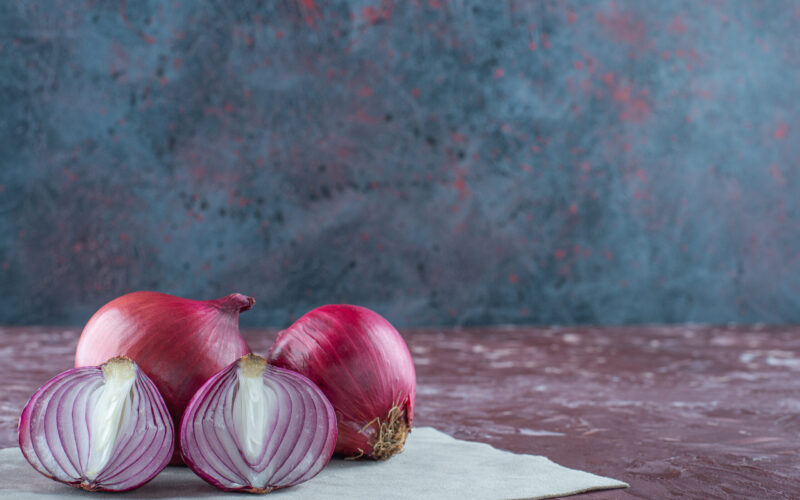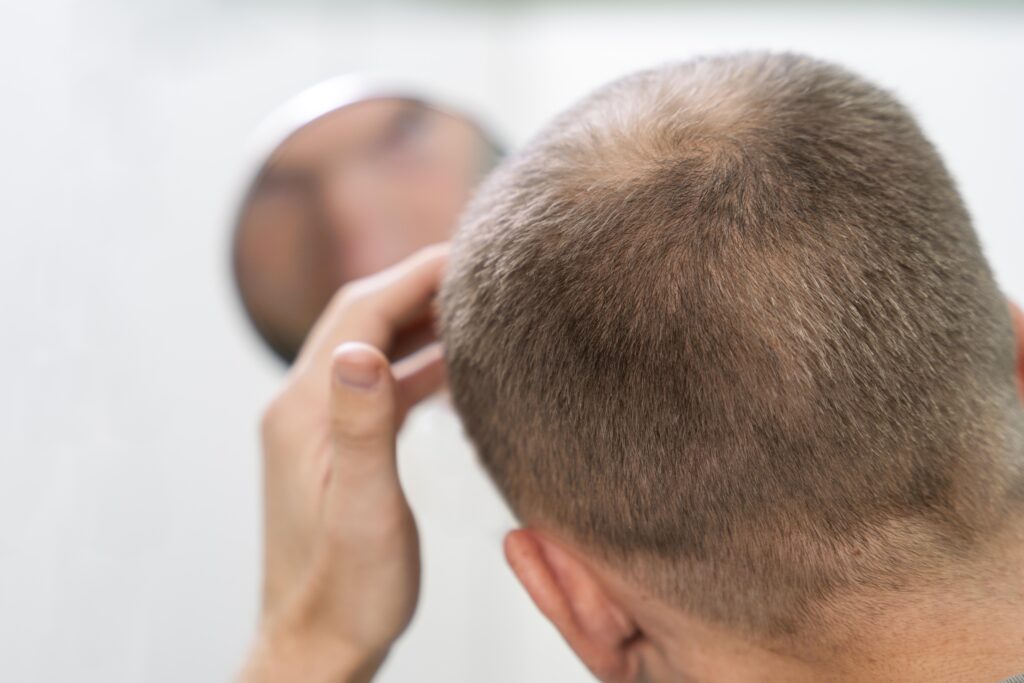Onion water for hair involves using a mixture of onion juice and water as a hair treatment. Proponents claim that the sulfur in onions may promote hair growth, strengthen hair, and improve overall hair health. However, the strong smell of onions can be off-putting, and it’s important to perform a patch test to check for any adverse reactions before applying onion water to the scalp.
Table of Contents
How to make at home?
Peel and dice an onion into small pieces. Utilize a blender or food processor to finely process the chopped onion into a paste. Extract the juice by straining the paste through a cotton cloth.
How to use or apply on Scalp?
Apply the onion juice directly to your scalp and hair roots, ensuring even distribution with a gentle massage for a few minutes. Allow the onion juice to stay on your hair for a minimum of 30 minutes to an hour. Rinse your hair thoroughly using a mild shampoo and cool water.
Benefits of onion water on Hair
Benefits of onion water on hair include:
- Promotes Hair Growth: Onion water contains sulfur, which stimulates hair follicles, promoting hair growth and preventing hair loss.
- Strengthens Hair: The sulfur compounds in onion water help strengthen hair strands, reducing breakage and split ends.
- Improves Scalp Health: Onion water has antimicrobial properties that can help combat scalp infections and dandruff, promoting a healthier scalp environment.
- Increases Blood Circulation: Massaging onion water into the scalp can improve blood circulation, delivering essential nutrients to the hair follicles for healthier hair growth.
- Adds Shine and Luster: Regular use of onion water can enhance the shine and luster of hair, making it look healthier and more vibrant.
- Natural Conditioner: Onion water acts as a natural conditioner, moisturizing the hair and improving its texture and softness.
- Balances pH Levels: Onion water helps balance the pH levels of the scalp, creating an optimal environment for hair growth and overall scalp health.
- Reduces Dandruff: The antibacterial properties of onion water can help reduce dandruff and soothe an itchy scalp, improving overall scalp condition.
- Prevents Premature Greying: The antioxidants in onion water can help prevent premature greying of hair by combating free radical damage.
- Cost-Effective Solution: Onion water is a cost-effective and natural alternative to commercial hair care products, providing numerous benefits without harmful chemicals.
Side effects on Hair and Scalp
While onion water has gained attention for its potential benefits for hair health, it’s essential to consider its possible side effects as well. Some individuals may experience irritation or allergic reactions when using onion water on their hair or scalp. This can manifest as redness, itching, or a burning sensation. It’s crucial to perform a patch test before applying onion water widely to ensure you don’t have a negative reaction.
Another side effect to be mindful of is the strong smell associated with onion water. The potent odor of onions can linger on your hair even after rinsing, which may not be appealing to everyone. If you’re sensitive to strong smells or if you’re concerned about smelling like onions, you may want to consider using onion water sparingly or diluting it with other ingredients to mask the scent.
Additionally, onion water can sometimes cause dryness or irritation to the scalp if used excessively or if left on for too long. This can lead to discomfort and may exacerbate existing scalp conditions such as dandruff or dermatitis. To mitigate this risk, it’s advisable to limit the frequency of onion water treatments and to ensure you thoroughly rinse your hair and scalp after each use to remove any residue. Overall, while onion water can offer benefits for hair health, it’s essential to be aware of these potential side effects and to use it cautiously.
Research and studies
Research on the effects of onion water on hair health is still ongoing, but some studies have provided promising insights into its potential benefits. One notable study published in the Journal of Dermatology in 2002 examined the efficacy of onion juice in treating patchy alopecia areata, a condition characterized by hair loss in specific areas of the scalp.
The study involved 38 participants who applied onion juice to their scalps twice daily for two months. Remarkably, the results showed that 86.9% of participants experienced new hair growth, with higher success rates observed in those who started treatment within six months of developing alopecia areata. While this study focused on a specific type of hair loss, its findings suggest that onion juice may have positive effects on hair regrowth.
Furthermore, a more recent study published in the Journal of Cosmetic Dermatology in 2018 investigated the potential benefits of onion juice in promoting hair growth in patients with androgenetic alopecia, also known as male or female pattern baldness. The study involved 38 participants who applied onion juice to their scalps twice daily for six weeks. The results demonstrated a significant increase in hair growth and hair density among the participants, indicating the potential of onion juice as a natural remedy for hair loss.
While more research is needed to fully understand the mechanisms behind the effects of onion water on hair health, these studies suggest that it may indeed have a positive impact on promoting hair growth and reducing hair loss. Further exploration into the specific compounds and mechanisms involved could pave the way for the development of new hair care treatments harnessing the power of onions.
Alternatives of Onion water
If onion water doesn’t quite suit your preferences or you’re looking for alternative hair care options, there are plenty of other natural remedies that can promote hair health. One popular choice is aloe vera, which is well-known for its soothing and moisturizing properties. Aloe vera gel can be applied directly to the scalp to nourish hair follicles, reduce inflammation, and promote healthy hair growth. Its cooling effect can also help alleviate scalp irritation and itchiness.
If you are struggling to find the cause of your hair loss, this article on DHT and its blockers may be for you.
Another excellent alternative is coconut oil, which is rich in vitamins and fatty acids that nourish the scalp and hair. Massaging coconut oil into the scalp can improve blood circulation, strengthen hair follicles, and prevent protein loss from the hair shaft, leading to softer, shinier locks. Coconut oil can also serve as a natural conditioner, helping to hydrate and repair damaged hair. Simply warm the oil slightly, apply it to the scalp and hair, leave it on for a few hours or overnight, and then rinse thoroughly.
For those seeking a herbal remedy, rosemary essential oil is a fantastic option. Rosemary oil has been shown to stimulate hair growth, improve circulation to the scalp, and prevent premature graying. It also has antimicrobial properties that can help maintain a healthy scalp environment and reduce dandruff. Mixing a few drops of rosemary oil with a carrier oil like olive or jojoba oil and massaging it into the scalp regularly can promote thicker, healthier hair over time. These alternatives offer a range of benefits for hair health and can be easily incorporated into your hair care routine.
Picture credits; Image by azerbaijan_stockers on Freepik




